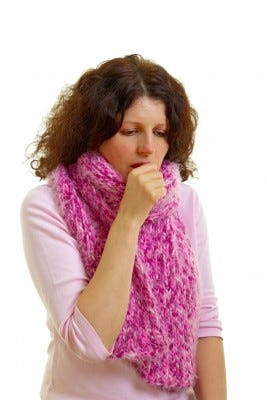Chronic cough isn't all in your head -- only part of it is

Like many other bodily functions, coughing is a complex phenomenon that is under both conscious and unconscious control. Coughing during an acute bronchitis or after inhaling a lungful of seawater is vigorous and involuntary. A slight tickle in the back of the throat that creeps up when we're on a first date or in a crowded theater, on the other hand, may or may not trigger a cough. The reasons lie in the complex neural interconnections between our chests, throats, and brains, a running conversation between lower-order reflex circuits (saying "Must! Cough! Now!") and our higher cortical brain functions (which might reply, "Dude! I'm talking to this girl.")
Jennifer Leech, Stuart B. Mazzone, and Michael J. Farrell have actually mapped some of the cortical areas producing the urge to cough and those brain areas that inhibit cough. They've drawn parallels between the active circuits in chronic cough and those of chronic pain, helping lead to a recent randomized trial showing gabapentin can improve chronic cough. Others have shown that nicotine gum reduces anxiety and the urge to cough in anxious smokers deprived of cigarettes.
In the October 2012 Chest, Ms. Leech et al ask an almost diabolically mischievous question: Can people be tricked out of coughing?
Placebo Reduces Coughing In Healthy Volunteers
Investigators recruited 21 young, healthy adult volunteers (who did not have chronic cough). They had each volunteer inhale capsaicin (found in cayenne and chili peppers) in increasing doses, and rate their urge to cough on a 0-10 scale.
But here's the twist. Half the subjects (nonrandomized) were given a placebo inhaler labeled "Lidocaine," and told it was an anesthetic that prevented cough. After participants took puffs of the placebo inhaler, the crafty authors steadily reduced the subsequent concentration of capsaicin over several inhalations. Of course, the participants had less urge to cough. But more interesting, they were then preconditioned to cough less after the "lidocaine" placebo inhaler. When they were subsequently challenged with higher doses of capsaicin after using the placebo inhaler, concentrations that previously made them cough often no longer did. The reduction in urge to cough was about 40% during the period subjects believed the "lidocaine" had its peak effect. Almost all the patients showed a strong placebo response.
The other half of patients were given an unlabeled inhaler and told it had inert gas. Using the obvious placebo without the brain-priming deception did not reduce the urge to cough.
Placebo: Best Cough Medicine Ever?
Placebo may be the most effective treatment of all for cough: a 2002 meta-analysis showed an 85% response rate in placebo arms of randomized trials testing antitussive medicines for cough reduction in people with upper respiratory infections (colds) -- a much higher resolution rate than would be expected with time alone. Codeine, dextromethorphan, and other cough treatments have shown little if any consistent benefit over placebo in randomized trials.
Chronic cough, while often due to asthma, post-nasal drip of mucus from sinuses, gastroesophageal reflux disease (GERD) or ACE-inhibitor use (lisinopril), may persist in many people for months or even years despite empiric treatment for these conditions. An increase in the sensitivity of the cough reflex has been demonstrated in chronic cough sufferers, and as these authors have previously shown, cortical pathways play a role that is probably very important, though as yet poorly understood. Their new paradigm explains chronic cough as arising from hierarchical neural pathways -- mechanisms analogous to those operative in chronic pain. A small 2012 study in Lancet showing improvement of chronic cough with gabapentin (an anticonvulsant therapy used in chronic pain treatment) was a promising proof-of-concept for the therapeutic potential of modulating these neural pathways for cough.
In Germany and some other countries, prescription of placebos is considered ethical and appropriate (because of their effectiveness for various symptoms), and the practice is widespread (~90% of German doctors have provided placebos) and endorsed by the German version of the AMA. In the U.S., giving placebos is considered unethical by the AMA, unless the patient is fully informed, but some physician-ethicists argue in favor of placebo use.
Jennifer Leech, Stuart B. Mazzone, and Michael J. Farrell. The Effect of Placebo Conditioning on Capsaicin-Evoked Urge to Cough. Chest 2012; 142: 951-957.


